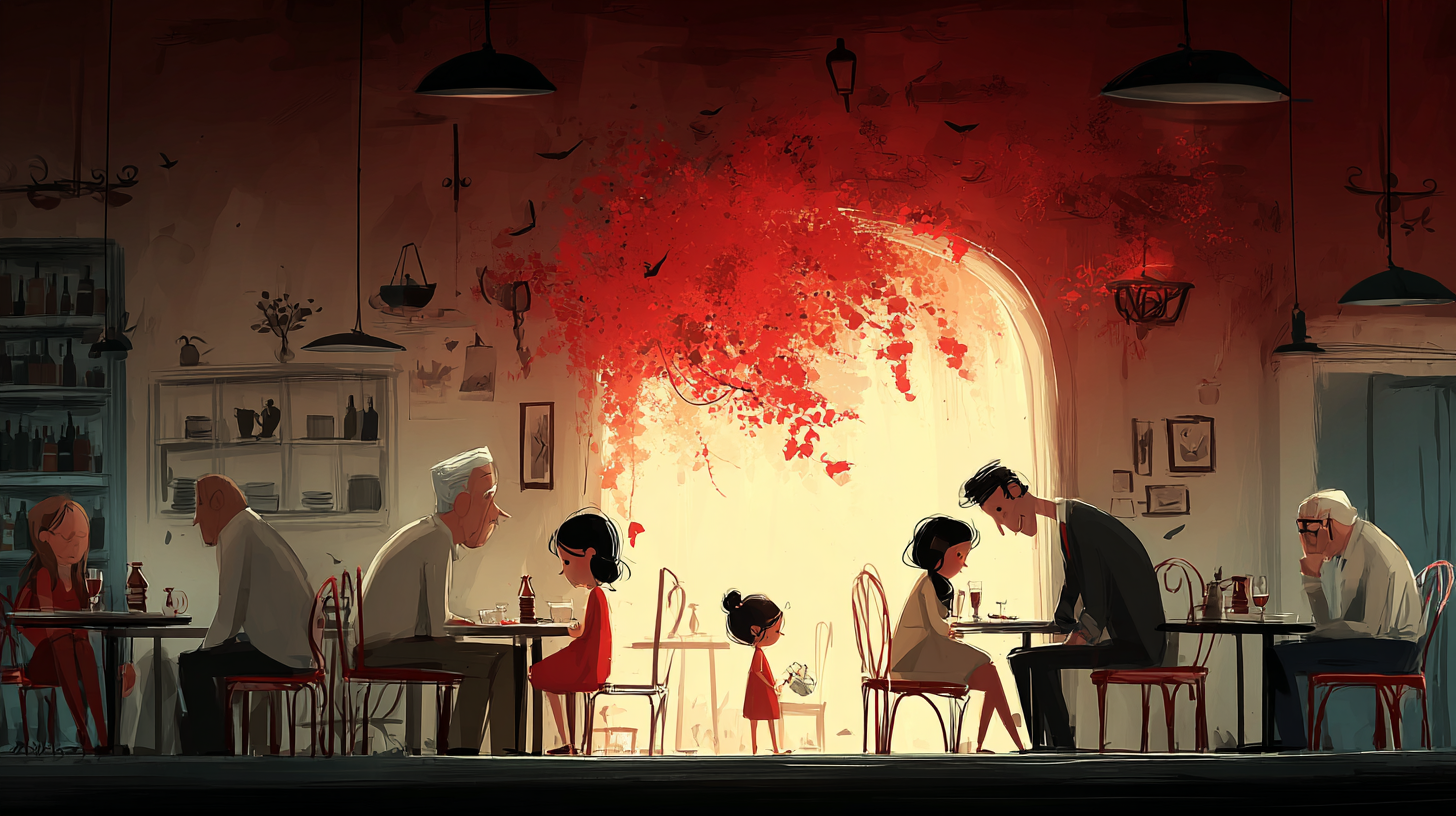A place where people buy and eat food.
人が食事を買って食べる場所。
以下は英単語 “restaurant” に関するストーリー型学習コンテンツです。まずは大枠の意味を理解して最後の文章で確認しましょう。
主な意味(main meaning)
| 品詞 | 意味 | 発音記号 | 例文 |
|---|---|---|---|
| 名詞 | 食事を提供する場所 | /ˈrɛstərɒnt/ | We had dinner at a new restaurant last night. |
語源(etymology)
「restaurant」はフランス語 restaurer(回復させる、元気を取り戻させる)から来ており、「体を回復させる場所」というイメージを持つ。
類義語(synonyms)
| 類義語 | 例文 |
|---|---|
| café | We stopped at a small café for coffee. |
| diner | They had breakfast at a local diner. |
| bistro | The bistro serves simple but delicious meals. |
| eatery | That new eatery downtown is very popular. |
反義語(antonyms)
| 反義語 | 例文 |
|---|---|
| home | She prefers cooking at home instead of going to a restaurant. |
| kitchen | They ate in their kitchen rather than visiting a restaurant. |
コロケーション(collocations)
| コロケーション | 例文 |
|---|---|
| fast-food restaurant | There is a fast-food restaurant near the station. |
| family restaurant | We went to a family restaurant after the movie. |
| fancy restaurant | He proposed to her in a fancy restaurant. |
| seafood restaurant | They enjoyed fresh fish at a seafood restaurant. |
2項表現(binomials)
| 2項表現 | 例文 |
|---|---|
| food and drink | The restaurant offers various kinds of food and drink. |
| salt and pepper | The restaurant tables had salt and pepper shakers. |
英語ストーリー(english story)
Mr. Smith had just moved to a new city for his job. After unpacking his things, he felt hungry and decided to look for a restaurant. He searched online and found a family restaurant only ten minutes away. He thought it was a good chance to explore the neighborhood and enjoy some food and drink.
When he arrived, the restaurant was full of people. Some families were enjoying dinner together, and a few students were chatting at a table. Mr. Smith liked the warm atmosphere. A waiter came and showed him to a table. On the table, he noticed salt and pepper shakers, a menu, and a glass of water.
He looked through the menu. The restaurant was not a fast-food restaurant, but it served meals quickly. There were several choices, including pasta, grilled chicken, and fish. Since he liked seafood, he ordered grilled salmon.
While waiting for his meal, Mr. Smith remembered how different places to eat had different styles. Back in his old town, there was a small café where he used to read books while drinking coffee. He sometimes went to a diner with his colleagues for breakfast. In the evenings, he enjoyed visiting a cozy bistro with friends. Each eatery gave him a different experience.
The waiter soon brought his meal. The salmon looked fresh and delicious. Mr. Smith enjoyed it very much. He thought about how restaurants were not just for eating but also for meeting people and relaxing. Although eating at home in his own kitchen could be cheaper, dining out sometimes gave him new energy.
As he finished his meal, the waiter asked, “Would you like dessert?” Mr. Smith smiled and said yes. He ordered a piece of chocolate cake. While eating it, he looked around and thought about his new life in this city. He was glad that he had found such a nice place on his first day.
He paid the bill and left the restaurant. Walking back to his apartment, he felt satisfied. He realized that restaurants were more than places to eat. They were places to create memories, share moments, and sometimes even start new chapters in life.
和訳
スミスさんは仕事のために新しい街に引っ越してきたばかりでした。荷物を片付け終わるとお腹がすいて、レストラン(restaurant:レストラン)を探すことにしました。ネットで調べると、10分ほどのところにファミリーレストラン(family restaurant:ファミリーレストラン)があるのを見つけました。新しい街を知り、食べ物と飲み物(food and drink:食べ物と飲み物)を楽しむいい機会だと思いました。
店に着くと、レストランは人でいっぱいでした。家族が一緒に夕食を楽しんでいたり、学生たちがテーブルでおしゃべりしていました。スミスさんはその温かい雰囲気が気に入りました。ウェイターが来て、テーブルに案内してくれました。テーブルの上には、塩とコショウ(salt and pepper:塩とコショウ)の入れ物、メニュー、そして水のグラスが置かれていました。
メニューを見てみると、そこはファストフードレストラン(fast-food restaurant:ファストフードレストラン)ではありませんでしたが、料理はすぐに出てくるようでした。パスタ、焼きチキン、魚などの選択肢がありました。彼は魚が好きなので、焼きサーモンを注文しました。
料理を待つ間、スミスさんはいろいろな食事処を思い出しました。以前住んでいた町には、コーヒーを飲みながら本を読める小さなカフェ(café:カフェ)がありました。同僚と一緒に朝食を食べに行ったダイナー(diner:簡易食堂)もありました。夕方には友人たちとビストロ(bistro:小さなレストラン)に行っていました。それぞれの食堂(eatery:食事処)には違った魅力がありました。
やがてウェイターが料理を運んできました。サーモンは新鮮で美味しそうでした。スミスさんはとても満足しました。レストランはただ食事をする場所ではなく、人と出会ったりリラックスしたりする場所でもあると考えました。自分のキッチン(kitchen:台所)で食べる方が安いこともありますが、外食することで新しい元気をもらえることもあります。
食事を終えると、ウェイターが「デザートはいかがですか?」と聞きました。スミスさんは笑顔で「はい」と答え、チョコレートケーキを注文しました。ケーキを食べながら、彼は周りを見渡し、この街での新しい生活について考えました。初日にこんな素敵な場所を見つけられてよかったと思いました。
会計を済ませてレストランを出ると、彼は満足感でいっぱいになりました。レストランはただの食事の場ではなく、思い出を作り、時間を共有し、ときには新しい人生の一歩を始める場所なのだと気づいたのです。
Q&A
Q: restaurant と café の違いは何ですか?
A: restaurant は食事をしっかり提供する場所を指します。café はコーヒーや軽食を中心に提供する小さな店を指すことが多いです。
Q: restaurant と diner の違いは何ですか?
A: diner は特にアメリカでよく使われる言葉で、カジュアルで比較的安い食堂を指します。restaurant はもっと広い意味で、カジュアルから高級まで含みます。
Q: restaurant と bistro の違いは何ですか?
A: bistro はフランス語由来で、小さくてカジュアル、家庭的な料理を出すレストランを指します。restaurant はより一般的な言葉です。
Q: restaurant と eatery の違いは何ですか?
A: eatery はとてもカジュアルな言葉で、「食べ物を出す店」という意味です。restaurant より口語的で広い範囲を指します。
Q: restaurant と fast-food restaurant の違いは何ですか?
A: restaurant は食事を提供する場所全般を指します。fast-food restaurant は短時間で出てくる料理(ハンバーガーなど)を専門にする店のことです。
Q: restaurant と family restaurant の違いは何ですか?
A: family restaurant は、子どもから大人まで楽しめるメニューがあり、家族向けのカジュアルなレストランを指します。普通の restaurant よりも「家族で行きやすい」という特徴があります。
Q: restaurant と fancy restaurant の違いは何ですか?
A: fancy restaurant は高級感のあるレストランを指します。高価で特別な体験をする場所です。普通の restaurant は値段や雰囲気に制限がありません。
Q: restaurant と seafood restaurant の違いは何ですか?
A: seafood restaurant は魚や貝などのシーフード料理を専門にするレストランです。普通の restaurant はいろいろな料理を扱います。



コメント